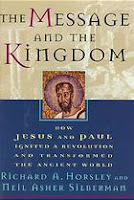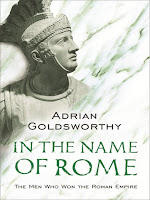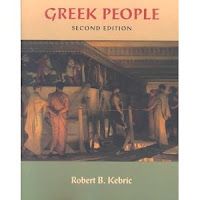As a young scholar, I have found myself time and again, amazed at the work that Bible scholars often come up with. Indeed, there are times where, when reading through a book or article, I have thought to myself "I wish I had said that!" or "I wish I had come up with that idea!" or "That's brilliant! I wish I had written it." In my view, when someone can make you think or say those types of things, they have done a superb job! Even more, I find those types of books or articles the most enjoyable to read.
On the flip side however, there comes a point in all of our lives when we say something that, after the fact, we wish would not have said. Of course, Bible scholars are humans, and they too say things that they often wish they had not said. There are also occasions in this field of study and research, where one finds themselves wishing others would not have said something that they did. This last type of example happened with me yesterday: Vernon Robbins said something that I wish he had not said. Now, don't get me wrong, I'm not speaking of Vernon on a personal level here, because in reality, I have had nothing but positive encounters with Vernon. He is a super creative guy, who has made fine contributions to the field of biblical studies. In fact, in my encounters with him at the Eastern Great Lakes Bible Society meetings over the last few years, I have come to like and respect him to an even greater degree. That respect has only been heightened by the fact that two of my mentors have commentaries coming out in a series he is overseeing. So, I like Vernon, and I'm thankful for what he has been able to bring to the table in terms of ideas and research. It would not be an overstatement to say that his research, through the two mentors referred to above, has had bearing on my own thinking. So, again, I'm grateful for Vernon and I am appreciative of all that he has done, is doing, and will do for the field.
Even so, I found myself wishing that Vernon would not have said what he did in yesterday's issue of
RBL (
Review of Biblical Literature). Robbins's review of another one of my mentor's (Ben Witherington) books, that is
What's in the Word: Rethinking the Socio-Rhetorical Character of the New Testament, left me somewhat frustrated. You can read the review for yourself in full
HERE. Now, I don't really care to comment on the tone of Robbins's review, other than to say that I found it a bit haughty; it sounded as though he was talking down to Witherington the entire time. I have not read
What's in the Word and therefore, I cannot comment on Robbins's critique of the content. Yet, even if the criticisms are on target, all I can say is that I personally would have chosen to go about writing the review with a different tone. Either way, that's not my main point here. Scholars can write however they please.
What I wish Vernon had not said is something that, in fact, he has also said elsewhere in print. More specifically, I wish Vernon had not said the following in the opening line of his article yesterday:
"When I created the term 'socio-rhetorical' in the subtitle of Jesus the Teacher in 1984, my purpose was to move rhetorical criticism of the New Testament forward beyond literary-historical criticism."
Why do I wish Robbins had not made this statement? Because it is inaccurate. Robbins, in fact, did
NOT create the term "socio-rhetorical" in 1984. In chapter 13 of
The Blackwell Companion to the New Testament (Pg. 192 - see
HERE) published in 2010, Robbins makes a similar statement:
"Emerging in the 1970s, socio-rhetorical interpretation received its name in 1984 with an integration of rhetorical, anthropological, and social-psychological insights in a study of the Gospel of Mark."
Here, Robbins is referring, once again, to his 1984 publication
Jesus the Teacher: A Socio-Rhetorical Interpretation of Mark. So, in both the 2010 and 2012 publications, Robbins is claiming that he "created" and gave "name" to what is now known as "socio-rhetorical" criticism/interpretation. (See also a 2004 publication where he claims the same
HERE.) Now, Robbins is not mincing words here. Indeed, he is laying claim to being the creator this term; no ifs, ands, or buts about it! Robbins has chosen these words carefully and purposefully. And for good reason: He is a rhetorical guy and words are important to him.
The problem is, however, that Robbins did not "create" the term socio-rhetorical. Had he said "...in 1984 when I introduced the field of biblical studies to this term..." that would have been one thing, but that is not what he said. He claims to have "created" the term. To create something (as it is used in this context) means to be the first to come up with the idea/thing and to be the originator of it. For instance, when the author of Genesis claims that God created the world, he is asserting that this world did not exist before God created it; it originated with God. Vernon is claiming that he invented the term "socio-rhetorical".
As I have already noted, however, this is inaccurate. All one would need to do to show that Vernon did not create this term is to show that prior to 1984, when he claims to have created it (a claim he makes in various publications), the term was already in use. Now, I could start with the term "social-rhetorical" which is slightly modified (the "al" on the end of "social" is replacing the "o") and show you that already in 1944 R. Moore and E. Lane, in a work titled
The Windmill, used this term (see
HERE). Or that a 1950 work titled
The Darkling Plain by J.H. Stubbs this term is also used (see
HERE). However, "social-rhetorical" is slightly different from "socio-rhetorical" although, one can certainly see an etymological connection.
Even so, I have two works, both out of Temple University, which use the precise term "socio-rhetorical" prior to 1984. The first one is the 1979/80 dissertation written by E.W. Mechling, which has the term "socio-rhetorical" in the title:
From Paradox to Parody: A Socio-Rhetorical Theory of Counter-Institutional Movement Organizations, Applied to Free Clinic Movement (see
Here). In fact, on page 1 of her dissertation, she titles the chapter "A Socio-Rhetorical Theory". As one might expect, she continues to use this term throughout her study. In fact, on the first page, she begins defining what she means by this term:
"The purpose of this study was to develop and apply a socio-rhetorical middle-range theory about one type of Social Movement Organization..."
In addition Mechling writes:
"The theory is socio-rhetorical in several respects. First, and most obviously, it draws on the writings of both sociologists (e.g., Weber, 1946/1976, 1947; Berger and Luckman, 1966; McCarthy and Zald, 1973, 1977) and rhetoricians (e.g., Burke, 1941/1973, 1945/1969, 1950/1969; Simons, 1970) for its theoretical formulations."
Of course, Mechling has more to say about this, but I need not cite her at any length here. Likewise, the term "socio-rhetorical" is found in the 1980 dissertation of Eric R. Weisman titled
The Rhetoric of Holocaust Survivors: A Dramatistic Perspective (see
HERE). In endnote #36 of chapter 2 he writes:
"For an excellent socio-rhetorical analysis of the Zealots' action, see Alfred A. Funk, 'A Durkheimian Analysis of the Event at Masada,' Speech Monographs, 41 (November, 1974), pp. 339-347."
So, what we have here are two works, both prior to 1984, which use the term "socio-rhetorical." This can only mean one thing: Vernon Robbins did not create the term "socio-rhetorical" as he claims! Perhaps Vernon thinks that he coined the term, but as I have shown, this is not the case. Witherington has asserted that Richard Longenecker had used the term already in 1970 (see
Here), but I was unable to turn up anything in print on that. So, for the time being, we can say two things with confidence: 1) Vernon Robbins did not create the term "socio-rhetorical" as he claims, and 2) E.W. Mechling should probably get the credit for coining this term, that is, unless it can be shown that someone used it before she did.
So, I return to my point above that I wish Robbins had not said what he did in yesterday's issue of RBL. By the same token, I wish that he had not made those claims in the 2010 publication of the Blackwell series. In the future, I hope he does not continue to make such claims. As we all know, claiming the work of another (esp. prior to your own) is called plagiarism. Now, I'm not accusing Robbins of plagiarism, not in the least. What I am saying, however, is that Robbins, who likely thought of or imagined himself as creating the term, simply did not. To fail to acknowledge this while at the same time continuing to make claims that he coined the term in 1984 would then seem to fall into this category.
I would like to say one last thing. I prefaced this post with acknowledging that I am appreciative of Robbins's work. I also spoke of how grateful I am for the gains he has helped the field make. So, in no way at all am I attempting to drag him through the mud. In fact, I've written in nothing but a kind and gentle tone. At the same time, while I appreciate Ben Witherington and consider him a dear friend and mentor, I'm not acting as an apologist for him. Instead, I am simply trying to show that Robbins's claim that he keeps making about the origins of the term "socio-rhetorical" is inaccurate. Further, he should not be implying that Ben stole it from him, if in fact, he was not the one who created it. In fact, if anyone should be questioned about taking the term, it is likely Robbins himself. Besides, terms get picked up and resused and recycled in biblical studies all of the time, as anyone with a little knowledge of modern interpretive history well knows. In other words, At the end of the day, I'm simply trying to shed light on the matter. I'm neither engaging in personal attacks nor trying to make enemies nor trying to defend others. As a researcher, I am simply putting the facts out there. And at the end of the day, if those of us in biblical studies are about getting after the truth, then I'm happy with what I've said here.
**UPDATE**I would also like to point out that I have found at least three other works that use of the term "socio-rhetorical" prior to 1984, the year marking Vernon's claim to having created it. See the following: D.D. Nimo,
Handbook of Political Communication (1981 - Pp. 438 and 439 both occasions referencing Mechling -
HERE), D. Ehninger & R.E. McKerrow,
Explorations in Rhetoric: Studies in Honor of Douglas Ehninger (1982 - Pp. 32, 34 and 35 -
HERE), and D.M. Lessing,
Documents Relating to the Sentimental Agents in the Volyen Empire (1983 - Pg. 164 -
HERE).
Also, if there is any doubt that Vernon believes that he "coined" this term, see this Twitter comment (06/08/12):
 In about 5 weeks I will be taking my Comprehensive Exams. As I continue to prepare for this major 3-part test and as the time draws nigh, I cannot help but feel overwhelmed. Of course, there is the actual test-prep that causes anxiety, but there are also a number of other factors, some not directly related to the exams themselves that also add pressure. This all got me reflecting last night on the things that make being a Bible scholar so difficult. Would Jesus himself have been this interested in keeping up with all of the scholarly and popular "views" about him? He did ask, "Who do they say that I am?" but that was likely only a few years into it all. Would God's Son, if he were to come back and walk upon the earth, still have an interest in what folks are saying about him? How would he process it all? Anyway, last night, off the top of my head, I came up with 15 things that make being a Bible scholar difficult, which I'm sure many of you can add to. Here's my list. I wonder if you agree, disagree, and/or could add other things to this list?
In about 5 weeks I will be taking my Comprehensive Exams. As I continue to prepare for this major 3-part test and as the time draws nigh, I cannot help but feel overwhelmed. Of course, there is the actual test-prep that causes anxiety, but there are also a number of other factors, some not directly related to the exams themselves that also add pressure. This all got me reflecting last night on the things that make being a Bible scholar so difficult. Would Jesus himself have been this interested in keeping up with all of the scholarly and popular "views" about him? He did ask, "Who do they say that I am?" but that was likely only a few years into it all. Would God's Son, if he were to come back and walk upon the earth, still have an interest in what folks are saying about him? How would he process it all? Anyway, last night, off the top of my head, I came up with 15 things that make being a Bible scholar difficult, which I'm sure many of you can add to. Here's my list. I wonder if you agree, disagree, and/or could add other things to this list?















